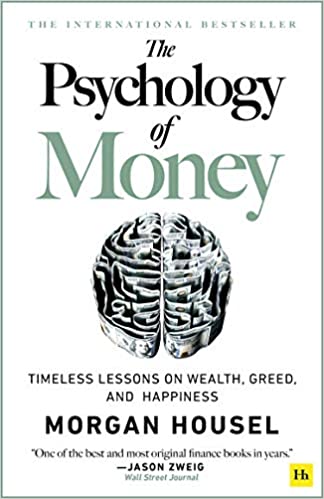This post is part of the 📖 The Psychology of Money series.
Today, I am reading second chapter Getting Wealthy vs Staying Wealthy from the book The Psychology of Money: Timeless lessons on wealth, greed, and happiness written by Author, Morgan Housel.
Doing well with money isn’t necessarily about what you know. It’s about how you behave. And behavior is hard to teach, even to really smart people.
In The Psychology of Money, award-winning author Morgan Housel shares 19 short stories exploring the strange ways people think about money and teaches you how to make better sense of one of life’s most important topics.
Yesterday, I read the fourth short storyConfounding Compounding from the book The Psychology of Money.
Getting Wealthy vs Staying Wealthy
Good investing is not necessarily about making good decisions. It’s about consistently not screwing up.
There are a million ways to get wealthy and plenty of books on how to do so. But there’s only one way to stay wealthy: some combination of frugality and paranoia.
Getting money is one thing. Keeping it is another. If I had to summarize money success in a single word, it would be “survival.
The Forbes 400 list of wealthiest Americans has, on average, roughly 20% turnover per decade for causes that don’t have to do with death or transferring money to another family member.
Capitalism is hard. But part of the reason this happens is that getting money and keeping money are two different skills.
Getting money requires taking risks, being optimistic, and putting yourself out there.
But keeping money requires the opposite of taking the risk. It requires humility and fear that what you’ve made can be taken away from you just as fast. It requires frugality and an acceptance that at least some of what you’ve made is attributable to luck, so past success can’t be relied upon to repeat indefinitely.
There are two reasons why a survival mentality is so key with money.
1) few gains are so great that they’re worth wiping yourself out over.
2) The counterintuitive math of compounding.
Compounding only works if you can give asset years and years to grow.
It’s like planting oak trees: A year of growth will never show much progress. 10 years can make a meaningful difference. 50 years can create something absolutely extraordinary.
But getting and keeping that extraordinary growth requires surviving all the unpredictable ups and downs that everyone inevitably experiences over time.
Key Takeaways
- Compounding only works if you can give asset years and years to grow.
That’s it for today. Tomorrow, we will continue the same chapter Getting Wealthy vs Staying Wealthy.
No One’s Crazy
Every decision people make with money is justified by taking the information they have at the moment and plugging it into their unique mental model of how the world works.
Luck & Risk
Nothing is as good or as bad as it seems. More important is that as much as we recognize the role of luck in success, the role of risk means we should forgive ourselves and leave room for understanding when judging failures.
Never Enough
There are many things never worth risking, no matter the potential gain. Knowing when you have “enough” is an invaluable skill. Building a sense for “enough” is remarkably simple: Stop taking risks that might harm your reputation, family, freedom and independence.
Don’t forget that being loved by those “whom you want to love” is invaluable than risking everything for money.
Confounding Compounding
Good investing isn’t necessarily about earning the highest returns. It’s about earning pretty good returns that you can stick with and which can be repeated for the longest period of time.
Buy or not to buy
If you want to be wealthy and then stay at the totem pole forever, you must immediately read this book. I bought several copies of this book to gift friends and family. It’s an easy read with a lot of anecdotes and real-life lessons. I already implemented several hacks in my life whistle taking investment decisions.
Author(s): Morgan Housel
Part 6 of 23 in the 📖 The Psychology of Money book series.
Series Start | The Psychology of Money: Timeless lessons on wealth, greed, and happiness - Day 5 | The Psychology of Money: Timeless lessons on wealth, greed, and happiness - Day 7
